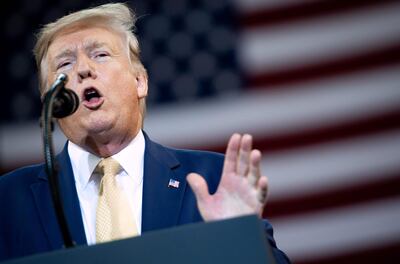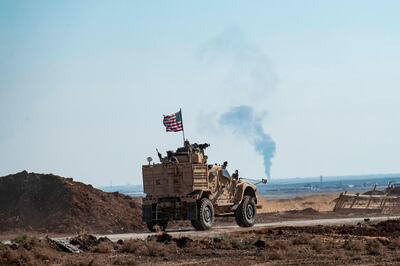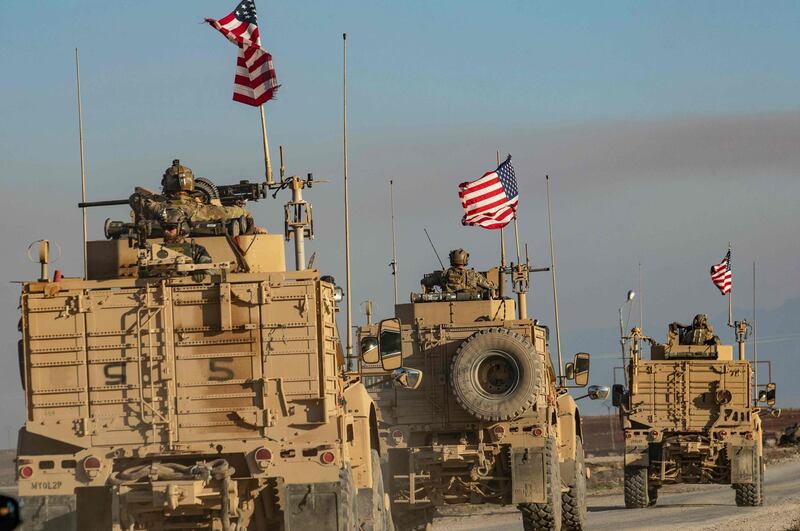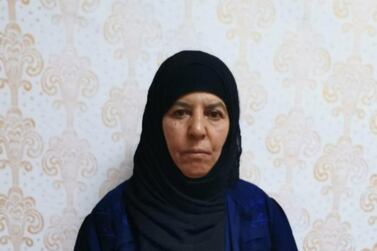US President Donald Trump has approved an expanded military mission to secure an expanse of oilfields across eastern Syria.
The move has raised difficult legal questions about whether American troops could launch strikes against Syrian, Russian or other forces if they threaten the oil, US officials said.
The decision, made after a meeting on Friday between Mr Trump and his defence leaders, puts US troops in a more complicated situation in Syria despite his pledge to pull America out of the war.
Under the new plan, troops would protect land controlled by Syrian Kurdish fighters, which stretches nearly 150 kilometres from Deir Ezzor to Hassakeh, but its exact size is still being determined.
Officials said many details still had to be worked out but Mr Trump’s decision handed commanders a victory in their push to remain in the country.
They wanted to prevent any resurgence of ISIS, counter Iran and collaborate with the Kurds, who battled the extremist group alongside the US for years.
But the move also forces lawyers in the Pentagon to draft orders for the troops that could lead to them firing on Syrian government or Russian fighters trying to take back oil centres in Syria.
Mr Trump’s order also ends any suggestion that most of the more than 1,200 American troops who have been in Syria will be going home soon, as he has repeatedly promised.

The Pentagon will not say how many troops will remain in Syria for the mission.
Other officials suggested the number could be at least 800 troops, including nearly 200 who are at Al Tanf garrison in southern Syria.
Lawyers are trying to work out the details of the military order, which would make clear how far troops could go to keep the oil in the Kurds’ control, officials said.
The legal authority for US troops going into Syria to fight ISIS militants was based on the 2001 and 2002 Authorisations for Use of Military Force.
They said America’s military could use all necessary force against those involved in the September 11 attacks and to prevent any future acts of international terrorism.
Legal experts say the US may have grounds to use the authorisations to stop the oil falling under ISIS control.

But protecting the oil from Syrian government forces or others could be harder to defend.
“The US is not at war with either Syria or Turkey, making the use of the authorisations a stretch,” said Stephen Vladeck, a national security law professor at the University of Texas at Austin.
Prod Vladeck said that while the US Constitution bestowed significant war powers on the president, they were generally meant to be about self-defence and the collective defence of the country.
Saying that securing the oil is necessary for national security “just strikes me as a bridge too far", he said.
Members of Congress, including Democratic Senator Tim Kaine, have also raised objections to the Trump administration using the authorisations as a basis for war against a sovereign government.
That type of action, Mr Kaine and others say, requires approval by Congress.
US officials said the order approved by Mr Trump did not include any mandate for the US to take Syria’s oil.
The president has said several times that the US is “keeping the oil” but the White House and the Pentagon have so far been unable to explain what he meant by that.
The US Secretary of Defence, Mark Esper, on Friday said he interpreted Mr Trump’s remarks to mean the military should deny ISIS access to the oilfields.
There were already several hundred US troops around Deir Ezzor, and more forces with armoured vehicles have begun to move in.
Officials have said the total force there could grow to about 500.
Mr Trump, Mr Esper and other defence leaders have said it is important to protect the oil so ISIS militants cannot regain control of the area and use the revenues to finance their operations.
The US-backed Syrian Kurdish forces have controlled the oil, supported by a small contingent of US troops.
A quiet arrangement has existed between the Kurds and the Syrian government, whereby Damascus buys the surplus in a smuggling operation that has continued despite political differences.
The Kurdish-led administration sells crude oil to private refiners, who use primitive home-made refineries to process fuel and diesel and sell it back to the administration.
It is unclear how long that agreement may continue. And if some dispute arises, US troops must have clear guidance on how to respond.
US troops can use military force to protect themselves.
But if, for example, Syrian government troops try to retake part of an oilfield and US troops are not near by, it is unclear now how much force they could use if they were not acting in self-defence.







